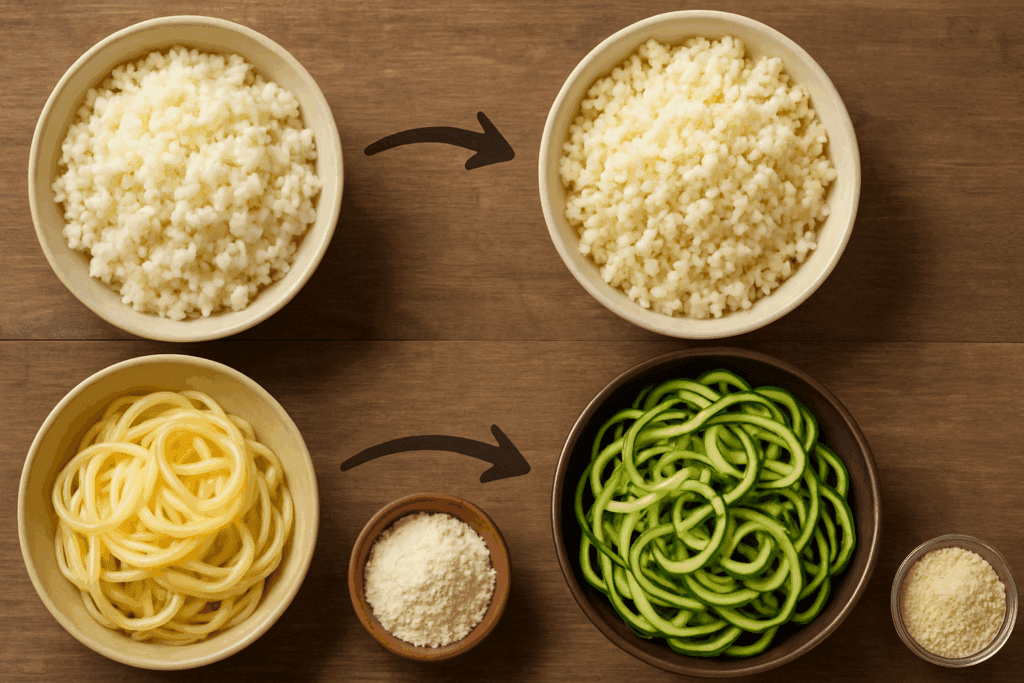Adopting a low carb lifestyle has become a widely embraced strategy for individuals seeking better metabolic health, sustainable weight loss, and improved energy levels. Yet with so many diet trends and contradictory information in circulation, finding a medically sound and practical starting point can feel overwhelming. That is where doctor-approved low carb meal plans come in—structured, evidence-based, and tailored to real-world lifestyles. These plans can help you initiate a free low carb diet plan that works with your body, not against it, while aligning with long-term wellness goals.
You may also like: Is the Keto Diet Safe or Dangerous? What Experts Say About the Risks, Benefits, and Basics of the Ketogenic Diet

Understanding the Science Behind Low Carb Diet Plans
Low carb diet plans are designed to reduce the body’s reliance on carbohydrates, encouraging it instead to burn fat for fuel—a metabolic process known as ketosis. When carb intake is limited, insulin levels drop and the body begins mobilizing stored fat to meet energy demands. This shift in fuel source often results in more stable blood sugar levels, reduced cravings, and enhanced fat loss over time. Research has consistently shown that low carb diet meal plans are effective for weight loss, particularly in individuals with insulin resistance, metabolic syndrome, or type 2 diabetes.
The underlying principle of a low carb eating plan is not about completely eliminating all carbohydrates but rather strategically reducing intake while prioritizing nutrient-dense whole foods. Complex carbohydrates from fibrous vegetables, modest portions of fruits, and low glycemic grains can still play a role, especially in moderate or liberal low carb diet menu plans. For individuals requiring stricter interventions, such as those following a 7 day no carb meal plan or zero carb meal plan, the approach becomes more restrictive, typically removing nearly all carbohydrate sources for a short period under medical supervision.

Benefits of Following a Doctor-Approved Low Carb Eating Plan
Doctor-approved low carb meal plans go beyond basic dietary adjustments by offering an evidence-based framework that is both nutritionally complete and medically sound. One of the primary advantages of such plans is improved blood sugar control. Individuals with prediabetes or type 2 diabetes often experience significant improvements in glycemic regulation when following structured low carb diet programs, which may reduce the need for medications over time. Additionally, these plans are linked with lower triglyceride levels and improved HDL (“good”) cholesterol profiles, contributing to better cardiovascular health.
Weight loss remains a central goal for many individuals embarking on a low carb diet menu plan. By limiting foods that rapidly spike blood glucose and increase fat storage, these plans encourage a natural reduction in calorie intake without the need for strict portion control or calorie counting. Satiety is also enhanced due to the higher intake of protein and healthy fats. Those seeking structured options often benefit from resources like a printable 30 day ketogenic diet plan PDF free of charge, which provides a clear roadmap for meal planning and grocery shopping.

How to Begin a Free Low Carb Diet Plan Without Feeling Deprived
Starting a new eating plan does not have to involve complicated tracking systems or costly meal prep services. A free low carb diet plan can be successfully implemented with the right foundational knowledge and preparation. Begin by focusing on whole foods that naturally contain low amounts of carbohydrates. These include leafy greens, non-starchy vegetables, lean meats, eggs, fish, nuts, and seeds. Healthy fats such as olive oil, avocado, and coconut oil are also staples in any low carb diet sheet or meal plan.
Transitioning to a low carb lifestyle should be approached gradually for best results. Reducing carbohydrates too quickly can sometimes lead to temporary side effects, commonly known as the “low carb flu,” which includes fatigue, headaches, and irritability. Staying well-hydrated, consuming adequate sodium, and slowly tapering carbohydrate intake over a few days can help ease this process. Utilizing a beginner-friendly 7 day low carb meal plan can provide a structured and gentle on-ramp to this way of eating, ensuring that meals are satisfying and balanced.

Creating a Sustainable Low Carb Diet Menu That Works for You
A successful low carb diet menu plan is not one-size-fits-all. Customization is key, as dietary needs vary based on factors such as activity level, metabolic health, food preferences, and medical conditions. Some individuals may thrive on a low fat low carb diet, especially if their goal is to manage both insulin sensitivity and cardiovascular risk. Others may find better success incorporating more dietary fat to enhance satiety and energy levels, particularly when following a ketogenic or zero carb meal plan.
Sustainability also hinges on meal variety and enjoyment. No one wants to eat bland food day after day, and monotony is a frequent reason why many diet plans fail. Planning meals in advance, rotating protein sources, experimenting with herbs and spices, and exploring low carb substitutes for traditional high-carb favorites can make a tremendous difference. A thoughtfully constructed low carb menu plan may include zucchini noodles instead of pasta, cauliflower mash in place of potatoes, or almond flour wraps as a grain-free bread alternative.
The Role of Structured Meal Planning and Diet Sheets
Structured tools like a low carb diet sheet or meal prep template serve as essential resources for success. These tools help take the guesswork out of meal planning and ensure nutritional balance throughout the week. A downloadable or printable 30 day ketogenic diet plan PDF free from reputable sources often includes daily meal breakdowns, snack ideas, shopping lists, and tips for overcoming common obstacles. These resources not only improve adherence but also build confidence as individuals learn how to make informed food choices.
For beginners, a low carb diet meal plan with clear structure can be particularly valuable. It allows you to observe patterns in your hunger, energy levels, and digestion, providing useful feedback that informs future adjustments. Whether you are seeking a mild reduction in carbohydrates or a no carb diet menu plan for short-term metabolic reset, structure makes consistency more achievable and minimizes feelings of restriction.
Choosing Between No Carb, Low Carb, and Moderate Carb Approaches
The spectrum of low carb diet plans ranges from liberal to highly restrictive. Understanding where you fall on this continuum is essential. A moderate low carb eating plan typically allows for 50 to 100 grams of net carbs per day and may include small portions of legumes, fruit, and whole grains. This is a sustainable long-term option for many people, particularly those using low carb diet programs as part of a preventative wellness strategy.
A stricter low carb diet menu typically caps carbohydrates at 20 to 50 grams per day and is more commonly associated with therapeutic benefits, such as reducing inflammation or managing epilepsy and insulin resistance. On the most restrictive end, the 7 day no carb meal plan and the zero carb meal plan eliminate virtually all plant-based carbohydrates, focusing solely on meat, eggs, and fat sources. While these approaches may offer short-term metabolic benefits, they are best pursued under clinical guidance to ensure nutritional adequacy.

Overcoming Common Challenges With Low Carb Diet Meal Plans
One of the most frequently cited challenges with a low carb eating plan is the initial adjustment period. The body needs time to adapt to using fat for fuel, and symptoms such as brain fog, sugar cravings, or muscle fatigue are not uncommon. Preparing for this transition with an easy-to-follow 7 day low carb meal plan can provide a smoother entry point and help mitigate these effects. Including mineral-rich foods like bone broth, leafy greens, and avocados can also support electrolyte balance during this adaptation.
Social situations can also present hurdles. Dining out, attending family events, or facing peer pressure can lead to deviations from your low carb diet menu. The key is flexibility and preparation. Many restaurants now offer low carb alternatives, and bringing a dish to gatherings ensures there is something you can enjoy. Learning how to navigate these scenarios with confidence is a hallmark of long-term success in low carb diet programs.
Exploring Low Carb Diet Programs and Support Resources
There is no shortage of low carb diet programs available, ranging from self-guided digital plans to medically supervised clinical interventions. Choosing the right program depends on your goals, health status, and the level of support you need. Some prefer the independence of a free low carb diet plan, relying on educational materials and recipe guides. Others may benefit from programs that include access to dietitians, health coaches, or virtual community groups.
The rise in popularity of downloadable resources, such as a printable 30 day ketogenic diet plan PDF free to the public, has expanded access to structured dietary interventions without the high cost. These programs often include educational materials on meal timing, macronutrient balance, and food tracking. They are particularly useful for individuals who enjoy data-driven approaches and want a tangible framework for success.
Integrating Exercise and Lifestyle Changes for Better Outcomes
While nutrition is a cornerstone of weight management and metabolic health, combining a low carb eating plan with physical activity amplifies results. Resistance training, walking, and other moderate-intensity activities help preserve muscle mass during weight loss and improve insulin sensitivity. Movement also supports mental well-being, which can further enhance adherence to dietary changes.
Sleep quality, stress management, and social support are additional factors that influence the success of low carb diet plans. Chronic stress and poor sleep can sabotage even the most meticulously planned diet by increasing hunger hormones and reducing willpower. Incorporating mindfulness techniques, setting consistent sleep routines, and seeking support from friends or professionals can all contribute to a more holistic and sustainable approach to health.
Maintaining Motivation and Tracking Progress
Sustaining a new way of eating requires more than willpower. Motivation is often fueled by visible progress and positive feedback. Keeping a journal, using tracking apps, or printing your own low carb diet sheet can help visualize success over time. Metrics such as waist circumference, energy levels, skin clarity, and mood stability are equally important indicators of progress, alongside the scale.
Celebrating non-scale victories can build confidence and reinforce commitment to your low carb menu plan. Examples include cooking new recipes, hitting personal bests in workouts, or resisting temptation in challenging situations. These milestones serve as reminders of how far you’ve come and the benefits you are continuing to experience.
Why Doctor-Approved Plans Are Safer and More Effective
Doctor-approved low carb diet meal plans stand out because they are designed with medical oversight and nutritional integrity in mind. They avoid the extremes and misinformation often found in trendy diets by grounding recommendations in peer-reviewed research and clinical best practices. These plans take into account individual variability, ensuring that strategies are personalized and safe for those with specific health concerns.
Working with a healthcare provider or dietitian to personalize your low carb diet programs can prevent nutrient deficiencies, manage medication adjustments, and monitor key biomarkers such as cholesterol, blood pressure, and A1C. This collaborative approach enhances both safety and effectiveness, ensuring that your transition to a healthier way of eating is supported every step of the way.
Frequently Asked Questions: Doctor-Approved Low Carb Meal Plans
1. Can I follow a low carb eating plan if I have a busy lifestyle and little time to cook? Absolutely. A well-designed low carb eating plan can actually simplify your routine once the basics are in place. Batch-cooking on weekends, choosing versatile ingredients like rotisserie chicken or pre-chopped vegetables, and relying on frozen low carb vegetables can save time without compromising nutrition. Many people with hectic schedules benefit from using a low carb diet sheet or rotating a simple low carb meal plan that includes time-saving recipes. With the rise of digital tools and apps that organize shopping lists, creating a custom low carb menu plan has never been more accessible.
2. What is the best way to adjust my low carb diet menu when I reach a weight loss plateau? Hitting a plateau is common, especially after initial success. This may be a signal that your body has adapted to your current routine. Tweaking your macros, incorporating intermittent fasting, or switching from a moderate plan to a stricter 7 day no carb meal plan can help kickstart progress again. You might also explore a more targeted low fat low carb diet to reduce caloric density without reducing food volume. Consider tracking your intake more precisely and rotating foods listed in a printable 30 day ketogenic diet plan PDF free of charge to diversify your nutrient profile.
3. Are low carb diet meal plans safe for long-term use, or are they just short-term fixes? Low carb diet meal plans are not only safe but sustainable when done correctly under professional guidance. Long-term use should emphasize nutrient diversity, fiber intake, and routine lab monitoring. People who personalize their approach using tools like a low carb diet menu plan or a 7 day low carb meal plan often report fewer cravings, better metabolic markers, and enhanced energy. These outcomes are even more consistent when the plan includes a balance of plant-based and animal protein sources. Many low carb diet programs today prioritize longevity and overall health, not just rapid weight loss.
4. Can a no carb meal plan help improve mental clarity and focus? Many individuals report enhanced cognitive performance when following a no carb meal plan or a zero carb meal plan. The brain can efficiently use ketones, derived from fat metabolism, as an alternative fuel source to glucose. This metabolic shift may reduce brain fog and support mental endurance, particularly during extended workdays or intellectually demanding tasks. However, it’s essential to hydrate and ensure sufficient electrolyte intake, especially when following a 7 day no carb meal plan. As always, consult your healthcare provider before attempting extreme carb restrictions, especially if you have neurological conditions.
5. How do I know if a free low carb diet plan I find online is trustworthy and nutritionally balanced? Not all online resources are created equal. Look for free low carb diet plan options provided by registered dietitians, academic institutions, or healthcare professionals who apply EEAT principles. These plans should include a variety of whole foods, explain macronutrient distribution, and provide practical applications like meal examples or a downloadable low carb diet sheet. Avoid plans that promise unrealistic results or completely exclude food groups without justification. A trustworthy plan will often resemble elements of a structured low carb menu plan or a vetted low carb diet program with built-in flexibility.
6. Are there differences in how men and women should approach low carb diet plans? Yes, biological differences can influence how individuals respond to various low carb diet plans. Women, especially those of reproductive age, may experience hormonal fluctuations that impact weight loss, energy, and sleep patterns. Some women benefit from a slightly higher carb threshold or cycling between a low carb meal plan and a moderate carb day every few days. Men often adapt more quickly to stricter versions like a 7 day no carb meal plan, but results will always depend on activity levels and baseline metabolic health. Monitoring how your body reacts to a new low carb diet menu can help fine-tune your individual approach.
7. What role does fiber play in a low carb menu plan, and how can I ensure I’m getting enough? Fiber is often overlooked in low carb diet meal plans, yet it plays a crucial role in gut health, blood sugar regulation, and satiety. Even on a lower carb diet, you can consume sufficient fiber by including flaxseeds, chia seeds, leafy greens, and low carb cruciferous vegetables. Some printable 30 day ketogenic diet plan PDF free guides will also list fiber-rich options that don’t significantly increase net carbs. Using a low carb diet sheet that tracks both carbs and fiber can help ensure you’re striking the right balance. Fiber supplementation may be considered under a doctor’s guidance if digestive regularity becomes an issue.
8. Can I incorporate a low fat low carb diet while maintaining athletic performance? Absolutely, but strategic planning is required. Athletes often fear low carb approaches will reduce performance, but when adapted correctly, a low fat low carb diet can enhance fat oxidation and improve endurance over time. The key is to prioritize lean proteins, hydrate well, and time carbohydrate intake around workouts using a structured low carb meal plan. Some athletes alternate between moderate and low carb phases during training cycles to optimize energy use. Customizing a low carb diet menu plan to your sport and training load ensures that performance is maintained without sacrificing health.
9. Are low carb diet programs effective for managing autoimmune conditions or inflammation? Emerging research suggests that low carb diet programs may help reduce systemic inflammation, which is often implicated in autoimmune disorders. By stabilizing blood sugar and insulin levels, a low carb eating plan can minimize inflammatory triggers and improve overall immune regulation. While not a cure, it may reduce symptom severity and flare-ups in conditions like rheumatoid arthritis or Hashimoto’s thyroiditis. People following a no carb diet menu plan often report reduced joint pain and fatigue, though results vary. It’s important to work with a healthcare provider who can monitor symptoms and adjust your low carb menu plan accordingly.
10. What are the psychological benefits of following a well-structured low carb diet sheet or program? In addition to physical improvements, many people find that a consistent low carb eating plan enhances emotional well-being. Stabilized blood sugar levels can reduce mood swings, irritability, and energy crashes that often accompany high carb diets. Having a clear, actionable low carb diet sheet or participating in guided low carb diet programs can also increase a sense of control and accountability. This psychological structure supports habit formation and long-term success, particularly for individuals who have struggled with yo-yo dieting. Whether you’re following a zero carb meal plan or easing in with a 7 day low carb meal plan, the clarity and confidence gained can make a profound difference.
Closing Reflections: Achieving Long-Term Wellness With the Right Low Carb Plan
Embarking on a free low carb diet plan can be a transformative journey when grounded in credible guidance and personal empowerment. The diversity of options—from moderate to strict approaches, from self-guided plans to professionally developed low carb diet programs—means that nearly anyone can find a method that aligns with their goals and lifestyle. By focusing on whole, nourishing foods and utilizing structured resources like a low carb diet sheet or a 7 day low carb meal plan, individuals can enjoy better health outcomes without feeling restricted.
What ultimately determines success is not perfection, but consistency, education, and a willingness to adapt. The best low carb meal plan is the one you can maintain over time—one that nourishes your body, supports your energy, and fits within the rhythm of your daily life. Whether you start with a 7 day no carb meal plan, experiment with a low fat low carb diet, or explore a printable 30 day ketogenic diet plan PDF free of charge, remember that every step forward is progress.
With the right tools, professional support, and a clear understanding of how to make informed food choices, your low carb journey can become not just a temporary diet, but a lasting lifestyle rooted in health, vitality, and sustainable weight management.
Further Reading:
Low-carb diet: Can it help you lose weight?
A Low Carb Meal Plan and Menu to Improve Your Health


